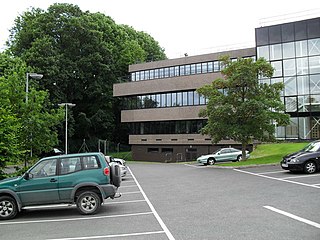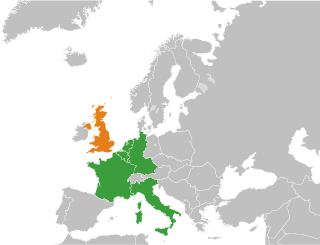Related Research Articles

The Council of the European Union, often referred to in the treaties and other official documents simply as the Council, and informally known as the Council of Ministers, is the third of the seven Institutions of the European Union (EU) as listed in the Treaty on European Union. It is one of two legislative bodies and together with the European Parliament serves to amend and approve or veto the proposals of the European Commission, which holds the right of initiative.

The European Communities Act 1972, also known as the ECA 1972, was an act of the Parliament of the United Kingdom which made legal provision for the accession of the United Kingdom as a member state to the three European Communities (EC) – the European Economic Community, European Atomic Energy Community (Euratom), and the European Coal and Steel Community ; the EEC and ECSC subsequently became the European Union.

The Common Agricultural Policy (CAP) is the agricultural policy of the European Union. It implements a system of agricultural subsidies and other programmes. It was introduced in 1962 and has since then undergone several changes to reduce the EEC budget cost and consider rural development in its aims. It has however, been criticised on the grounds of its cost, its environmental, and humanitarian effects.
Dumping, in economics, is a form of predatory pricing, especially in the context of international trade. It occurs when manufacturers export a product to another country at a price below the normal price with an injuring effect. The objective of dumping is to increase market share in a foreign market by driving out competition and thereby create a monopoly situation where the exporter will be able to unilaterally dictate price and quality of the product. Trade treaties might include mechanisms to alleviate problems related to dumping, such as countervailing duty penalties and anti-dumping statutes.

The Ministry of Agriculture, Fisheries and Food (MAFF) was a United Kingdom government department created by the Board of Agriculture Act 1889 and at that time called the Board of Agriculture, and then from 1903 the Board of Agriculture and Fisheries, and from 1919 the Ministry of Agriculture and Fisheries. It attained its final name in 1955 with the addition of responsibilities for the British food industry to the existing responsibilities for agriculture and the fishing industry, a name that lasted until the Ministry was dissolved in 2002, at which point its responsibilities had been merged into the Department for Environment, Food and Rural Affairs (Defra).
The Northern Ireland Executive is the devolved government of Northern Ireland, an administrative branch of the legislature – the Northern Ireland Assembly. It is answerable to the assembly and was initially established according to the terms of the Northern Ireland Act 1998, which followed the Good Friday Agreement. The executive is referred to in the legislation as the Executive Committee of the assembly and is an example of consociationalist ("power-sharing") government.

The minister of Canadian heritage is the minister of the Crown who heads Canadian Heritage, the department of the Government of Canada responsible for culture, media, sports, and the arts.

The Rural Payments Agency (RPA) is an executive agency of the UK Department for Environment, Food and Rural Affairs (Defra). Prior to Brexit, the RPA delivered the European Union (EU) Common Agricultural Policy (CAP) payments to farmers and traders in England, paying out over £2 billion in subsidies each year. The Agency managing more than 40 schemes, the largest of which the Basic Payment Scheme (BPS) paying more than £1.5 billion to around 105,000 claimants a year.

The Immigration Act 1971 is an act of the Parliament of the United Kingdom concerning immigration and nearly entirely remaking the field of British immigration law. The Act, as with the Commonwealth Immigrants Act 1962, and that of 1968, restricts immigration, especially primary immigration into the UK. It introduced the concept of patriality or right of abode. It was also partly passed to legally clarify the rights of Commonwealth citizens within the United Kingdom in preparation for membership of the European Communities (EC) in which the United Kingdom would become a member state from 1 January 1973. It was coincidentally the same day which the Act came into full legal force which gave not only new automatic rights to EC member state citizens but would also give them priority over non-EC citizens under the obligations of the Treaty of Rome, of which the UK become a signatory though the Treaty of Accession, signed on 22 January 1972. In relation to deportation notices, the Act is referenced at sections 11 and 23 of the Terrorism Act 2000.

The National Economic and Development Authority is an independent cabinet-level agency of the Philippine government responsible for economic development and planning. It is headed by the president of the Philippines as chairman of the NEDA board, with the Secretary of Socioeconomic Planning as vice-chairman. A number of Cabinet members, the Governor of the Bangko Sentral ng Pilipinas, the Chairperson of the Metropolitan Manila Development Authority, the Chief Minister of Bangsamoro, the Secretary of Information and Communications Technology, the Chairman of the Subic–Clark Area Development Corporation, and the National President of the Union of Local Authorities of the Philippines are members of the NEDA Board.
The Department of Agriculture, Environment and Rural Affairs (DAERA) is a government department in the Northern Ireland Executive, the devolved administration for Northern Ireland. The minister with overall responsibility for the department is the Minister of Agriculture, Environment and Rural Affairs. The department was called the Department of Agriculture and Rural Development between 1999 and 2016. The Minister of Agriculture previously existed in the Government of Northern Ireland (1921–1972), where the department was known as the Department of Agriculture for Northern Ireland or the Ministry of Agriculture. The current Permanent Secretary is Denis McMahon.
The Department for Communities is a devolved Northern Ireland government department in the Northern Ireland Executive. The minister with overall responsibility for the department is the Minister for Communities. The department was previously created in May 2016 following the Fresh Start Agreement and the dissolution of several departments, such as the Department for Social Development, the Department of the Environment, the Department of Culture, Arts and Leisure and the Department for Employment and Learning from which several functions have amalgamated.
In different administrative and organizational forms, the Food for Peace program of the United States has provided food assistance around the world for more than 60 years. Approximately 3 billion people in 150 countries have benefited directly from U.S. food assistance. The Bureau for Humanitarian Assistance within the United States Agency for International Development (USAID) is the U.S. Government's largest provider of overseas food assistance. The food assistance programming is funded primarily through the Food for Peace Act. The Bureau for Humanitarian Assistance also receives International Disaster Assistance Funds through the Foreign Assistance Act (FAA) that can be used in emergency settings.

Agriculture in the United Kingdom uses 69% of the country's land area, employs 1% of its workforce and contributes 0.5% of its gross value added. The UK currently produces about 60% of its domestic food consumption.

The Department of Justice is a government department in the Northern Ireland Executive, which was established on 12 April 2010 as part of the devolution of justice matters to the Northern Ireland Assembly. The position of Minister for Justice is currently vacant. The department's Permanent Secretary is Richard Pengelly. It combines the previous work of the Northern Ireland Office and the Ministry of Justice, within the United Kingdom Government, which were respectively responsible for justice policy and the administration of courts in Northern Ireland.
A milk quota or dairy produce quota was a historical measure used by the United Kingdom government to intervene in agriculture. Originally introduced to reflect the agricultural policies of the European Economic Community, the quota's purpose was to bring rising milk production under control. Milk quotas were attached to land holdings and represented a cap on the amount of milk that a farmer could sell every year without paying a levy. Milk quotas were assets and could be bought and sold or acquired or lost by other means and so there was a market for them.

Sarva Shiksha Abhiyan, or SSA, is an Indian Government programme aimed at the universalisation of Elementary education "in a time bound manner", the 86th Amendment to the Constitution of India making free and compulsory education to children between the ages of 6 and 14 a fundamental right. The programme was pioneered by former Indian Prime Minister Atal Bihari Vajpayee. It aims to educate all children between the ages of 6 and 14 by 2010. However, the time limit has been pushed forward indefinitely.

The accession of the United Kingdom to the European Communities (EC) – the collective term for the European Coal and Steel Community (ECSC), the European Economic Community (EEC) and the European Atomic Energy Community (EAEC) – took effect on 1 January 1973. This followed ratification of the Accession treaty which was signed in Brussels on 22 January 1972 by the Conservative prime minister Edward Heath, who had pursued the UK's application to the EEC since the late 1950s. The ECSC and EEC would later be integrated into the European Union under the Maastricht and Lisbon treaties in the early 1990s and mid-2000s.

The United Kingdom was a member state of the European Union (EU) and of its predecessor the European Communities (EC) – principally the European Economic Community (EEC) from 1 January 1973 until 31 January 2020. Since the foundation of the EEC, the UK had been an important neighbour and then leading member state, until Brexit ended 47 years of membership. During the UK's time as a member state two referendums were held on the issue of its membership, with the first being held on 5 June 1975, resulting in a vote to stay in the EC, and the second, held on 23 June 2016, which resulted in the vote to leave the EU.
Manitoba Transportation and Infrastructure is the provincial government department responsible for managing infrastructure in Manitoba. It is in charge of "the development of transportation policy and legislation, and [of] the management of the province’s vast infrastructure network."
References
- ↑ European Communities Act 1972, section 6 as enacted.
- ↑ Whitaker's Almanack 1977, page 410.
- ↑ The Intervention Board for Agricultural Produce (Abolition) Regulations 2001.